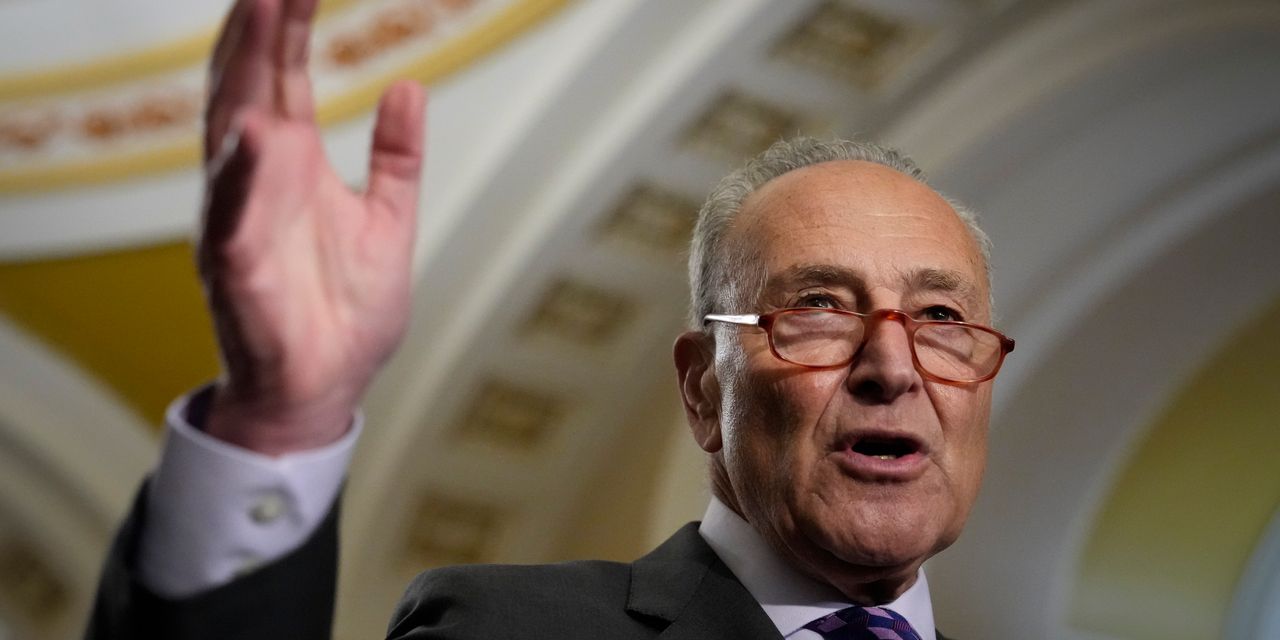Excitement over generative artificial intelligence and its potential to revolutionize the U.S. economy has swept through corporate boardrooms, and lawmakers in Washington are taking notice.
Senate Majority Leader Chuck Schumer of New York, a Democrat, is convening an inaugural AI Insight Forum on Capitol Hill Wednesday, bringing together some of the biggest names in tech to help lawmakers understand the technology and how to regulate it.
Attendees include Tesla Inc.
TSLA,
CEO Elon Musk, Microsoft Corp.
MSFT,
co-founder Bill Gates, Meta Platform Inc.’s
META,
Mark Zuckerberg and Google parent Alphabet Inc.
GOOGL,
GOOG,
chief Sundar Pichai, and Schumer hopes the meeting will provide a foundation for future legislation.
“Our world is already changing in dramatic ways because of artificial intelligence, but we’re likely just at the start,” Schumer said last week, adding that he hoped the forum will “supercharge” work on AI-related regulations.
Other invitees include OpenAI CEO Sam Altman, Microsoft CEO Satya Nadella, former Google CEO Eric Schmidt and IBM Corp.
IBM,
CEO Arvind Krishna. Amazon.com Inc.
AMZN,
CEO Andy Jassy and Adam Selipsky, who heads AWS, were invited to participate but declined because of a schedule conflict.
In the days leading to the summit, executives and investors in the AI field expressed a mix of hope and resignation over yet another star-studded tech summit.
“AI execs are playing rope-a-dope with lawmakers, asking them to please regulate us,” Tom Siebel, chief executive of C3.ai Inc.
AI,
said in an interview. “But there is not enough money and intellectual capital to ensure millions of algorithms are safe. They know it is impossible.”
Wednesday’s forum is the latest stab by lawmakers and companies to get ahead of potential disruptions wrought by generative-AI to jobs and society as a whole. They fear a repeat of being absent after they largely ignored the harmful aspects of social media years earlier, which regulators recall with dread and guilt.
“What is going to be the outcome of this forum? An executive order that is to land as a result or regulatory guardrails? I really hope we don’t repeat the same mistakes we made over social media,” said Navrina Singh, CEO and founder of Credo AI Corp., a software company that provides corporate governance for AI.
On the whole, Singh says she’s excited by the bipartisan approach to the meeting, though she yearns for more input from smaller companies. “These forums are generally led by Big Tech,” she said in an interview. “We need more feedback from smaller companies and the impact on innovation.”
Bryan Wise, chief information officer at software company 6sense, said “the conversation is the right conversation to have. You have to start somewhere.”
“With generative-AI, it is a brave new world. No matter what happens, the world needs to do something. But it takes a long time to get any meaningful action at all,” he said in an interview.
In remarks on the Senate floor, Schumer said that making laws that apply to AI “will be one of the most difficult things we’ve ever undertaken.” But, he said, “we cannot behave like ostriches sticking our heads in the sand when it comes to AI.”
Wednesday’s meeting is the first of what Schumer called an entire series lawmakers will hold this fall.
Waseem Daher, a serial entrepreneur who sold companies to Oracle Corp.
ORCL,
and Dropbox Inc.
DBX,
said that some regulation is important “so companies behave responsibly.” He added: “Bad regulation can really set back domestic companies, especially in competition with European companies.”
Muddu Sudhakar, the CEO and co-founder of Aisera, said there should be clarity on what Washington wants for companies in the AI space.
“Big tech seems perhaps too eager to call for regulation, which is a potential red flag,” said Sudhakar. “The success of OpenAI should reinforce how critical startups are to AI Innovation. As such, there should also be clear-cut standards on what needs to be regulated and how in order to mitigate the risks while upholding the opportunity for global leadership in the AI market.”
“Let’s not make the same mistakes as we did with social media,” Sheila Gulati, a former Microsoft executive who is now co-founder and managing director at Tola Capital, a venture capital firm that focuses on early-stage AI startups. “AI will create massive societal transition. It starts with understanding. He’s trying to get a basis of knowledge to share better. What we need is a clear framework for responsible and explainable AI.”
Read the full article here













Leave a Reply